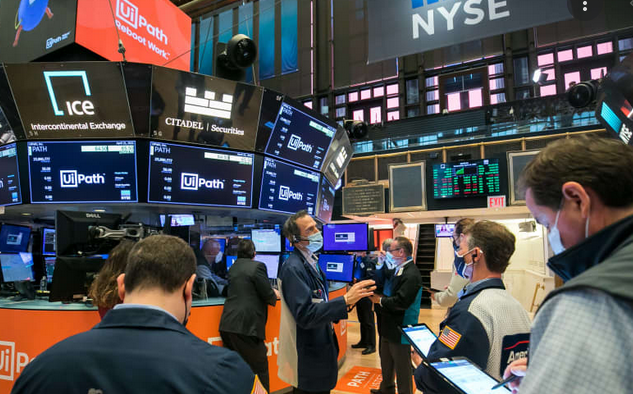Technology stocks posted solid gains on Wall Street on Friday, capping another strong week for the market as investors cheered solid gains from Apple and others.
The S&P 500 was up 2.5%, posting a 2-week gain for the first time since August. The Dow Jones Industrial Average rose 2.6%, while the high-tech composite index Nasdaq gained 2.9%. Smaller stocks also rallied, pushing the Russell 2000 Index up 2.3%.

Apple’s latest quarterly results showed that the iPhone maker made even bigger-than-expected gains over the summer. Its shares rose 7.6%, leading the rally in tech stocks, which had broadly fallen a day earlier.
Intel rose 10.7% after posting a much larger profit than analysts had forecast, despite the company reporting “deteriorating economic conditions.”
Gilead Sciences shares rose 12.9%, and T-Mobile US shares gained 7.4% after beating Wall Street’s earnings expectations.
Investors were also encouraged by the consumer spending report, which came out on the day after new data showed modest third-quarter growth in the economy and lower inflation.
“You have an economy that almost refuses to slow down, an economy that is inherently resilient, but at the same time inflation is slowing down, and that’s what the Fed wants, and that’s obviously what the Fed wants to market,” he said. Quincy Crosby, head of the equity strategy at LPL Financial.
Rate hike pace to slowdown
This helped boost Wall Street’s hopes of a Federal Reserve “reversal” if the central bank slows its pace of rate hikes. This move could revitalize the market, although many analysts believe the hopes may be overblown.
The central bank has made its plan to get it wrong and go too far to tame inflation very clear, meaning big gains from hopes of retreat seem premature, said Liz Young, SoFi’s chief investment strategist.
“The rally got a bit irrational and brittle at this level,” said Young.
- The S&P 500 rose 93.76 points to 3901.06.
- The Dow rose 828.52 points to 32,861.80.
- The Nasdaq rose 309.78 points to 11,102.45.
- Russell 2000 scored 40.60 to 1846.92.
Many large US companies report better-than-expected earnings, although the picture clearly remains mixed.

Strong earnings helped offset Amazon’s 6.8% decline as the company released weaker-than-expected earnings forecasts.
Earlier this week, meta platforms lost nearly a quarter of their value after reporting a second quarter of revenue declines due to falling ad sales and fierce competition from TikTok. Microsoft and parent company Google also reported slowdowns in key areas.
Such concerns have caused a sharp split between the lagging big tech stocks and the rest of the market on Wall Street this week.
The rate hike hit Big Tech stock prices harder than the rest of the market, and the pressure mounted on Friday as yields soared.
“It seems that the markets still don’t want to believe that we might be in a situation where a sales recession is possible,” Yang said.
US PCE and Fed’s stance
Data released this morning showed increases in wages and other workers’ compensation in the US over the summer aligned with economists’ expectations. This should keep the Fed on course to raise interest rates sharply in hopes of weakening the labor market enough to undermine the country’s high inflation. Other data showed that the Fed’s preferred measure of inflation (PCE, Personal Consumption Expenditure Index) remains very high, yet US households continue to spend more.
The Fed has hiked interest rates from 3% to 3.25%, although rates were close to zero in March. There is widespread expectation that the US CBR will hike rates again by 75 basis points next week but will switch to a less aggressive move from December. Higher interest rates slow down the economy and hurt stock prices and other investments.
The two-year Treasury yield, broadly in line with expectations for Fed action, rose to 4.42% from 4.28% at the end of Thursday. The 10-year yield, which helps set mortgage rates and many other loans, rose to 4.01% from 3.93%.


